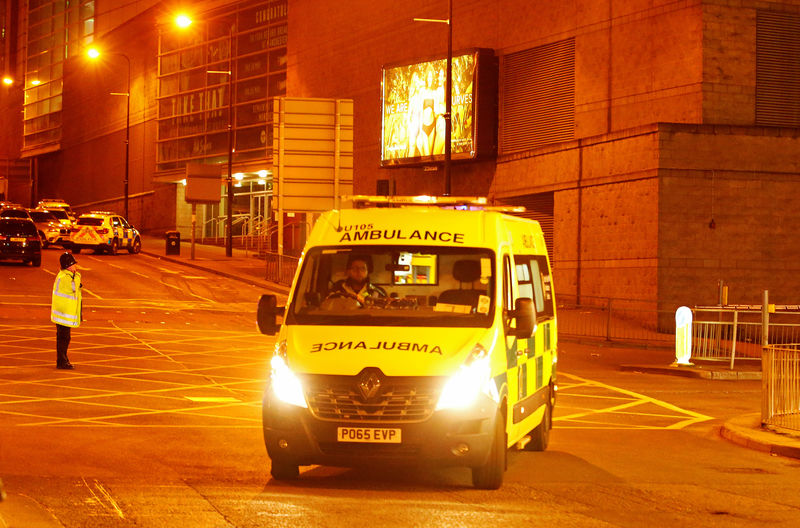By Nichola Saminather
SINGAPORE (Reuters) - Sterling slipped on Tuesday after a suspected suicide attack killed at least 22 people and wounded 59 at a pop concert in the English city of Manchester, while the euro held gains made after German Chancellor Angela Merkel said it was "too weak".
Despite the explosion, at a concert by U.S. singer Ariana Grande, European markets were poised for a positive, albeit subdued, start.
Financial spreadbetter CMC Markets expected Britain's FTSE 100 (FTSE) to open up 0.1 percent, and Germany's DAX (GDAXI) and France's CAC 40 (FCHI) to start the day little changed.
The attack came just two-and-a-half weeks before an election that British Prime Minister Theresa May is expected to win easily, although polls showing that the contest was tightening added to sterling's woes.
Sterling eased almost 0.2 percent to $1.2978
The pound dropped 0.4 percent to 144.06 yen (GBPJPY=), after losing 0.2 percent on Monday.
If the blast is confirmed as a terrorist incident, it would be the deadliest attack in Britain by militants since four British Muslims killed 52 people in suicide bombings on London's transport system in July 2005.
The impact on other areas of the market was limited, with Britain's FTSE futures (FFIc1) inching slightly lower, while S&P E-mini futures (ESc1) slipped 0.2 percent.
"We could see a bout of nervousness...but it's likely to be minor," said Shane Oliver, head of investment strategy at AMP Capital in Sydney. "Ever since 9/11, the impact on markets from terrorist events has been declining."
The euro
The common currency was little changed at $1.1231 after jumping as much as 0.5 percent and closing 0.3 percent higher on Monday.
MSCI's broadest index of Asia-Pacific shares outside Japan (MIAPJ0000PUS) gave up gains after hitting its highest level since June 2015 to trade 0.2 percent lower.
Japan's Nikkei (N225) closed down 0.3 percent.
Korean shares (KS11), which hit an all-time high on Tuesday, were last up 0.3 percent.
China's CSI 300 index (CSI300), swinging between gains and losses, were last up 0.3 percent after earlier losses on concerns over a regulatory crackdown on risky lending practices. The Shanghai Composite (SSEC) lost 0.5 percent.
Hong Kong's Hang Seng (HSI) lost 0.15 percent after earlier rising to its highest level since July 2015.
Overnight, Wall Street closed as much as 0.8 percent higher, driven by defense and technology stocks, after U.S. President Donald Trump announced arms deals and other investments with Saudi Arabia over the weekend that Secretary of State Rex Tillerson said could add up to $350 billion.
An uncertain political climate in the United States continued to weigh on the dollar.
The dollar was 0.3 percent lower at 110.945 yen
The dollar index (DXY), which tracks the greenback against a basket of trade-weighted peers, was flat at 96.97.
A gauge of U.S. economic activity that improved in April to its highest level since late 2014 helped limit the dollar's losses.
The White House is set to deliver Trump's first full budget to lawmakers later on Tuesday. The plan would cut $3.6 trillion in government spending over 10 years, balancing the budget by the end of the decade.
Presidential budgets are often ignored by Congress, which controls federal purse strings.
But the budget plan, which proposed the sale of half the country's strategic oil reserves, weighed on crude futures, offsetting optimism over expectations that other major oil producers would agree to extend supply curbs this week.
Global benchmark Brent (LCOc1) retreated 0.8 percent to$53.44 a barrel.
U.S. crude futures (CLc1) gave up all their earlier gains to edge lower to $50.71, after hitting their highest level in more than a month earlier in the session.

The weaker dollar lifted gold slightly. Spot gold